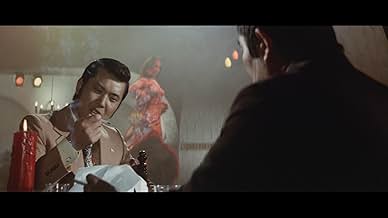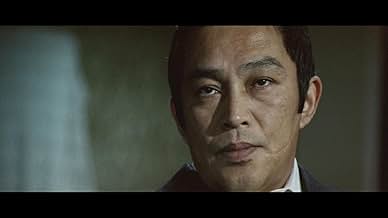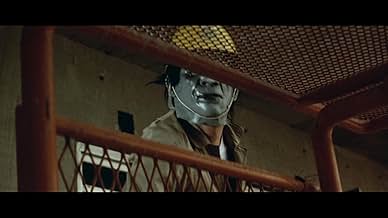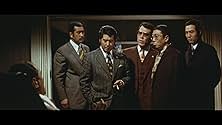A retired yakuza is caught in the middle of a growing conflict between two rival clans.A retired yakuza is caught in the middle of a growing conflict between two rival clans.A retired yakuza is caught in the middle of a growing conflict between two rival clans.
- Director
- Writers
- Stars
- Director
- Writers
- All cast & crew
- Production, box office & more at IMDbPro
Featured reviews
A first cursory look at VIOLENT STREETS makes it seem that Hideo Gosha reverted back to the programme genre pictures out of which emerged as a bonafide auteur and stylistic visionary five years earlier with bold ambitious jidaigekis like GOYOKIN and HITOKIRI, this time treading ground he never did before in his career, the yakuza picture. Looking closer it becomes obvious that VIOLENT STREETS is both. A genre picture and a stylistic exercise.
Different plot strands with which the avid genre fan will be familiar from prior cinematic knowledge, the rivalry between opposite yakuza groups, the new yakuzas trying to balance their past as street thugs with their future as incospicuous businessmen, the retired gangster forced back into action, a kidnapping gone awry, all these become entangled through a series of increasingly violent fights in the second third of the movie where VIOLENT STREETS inexorably emerges as a poignant revenge/ coming of age story.
What makes it so great is that VIOLENT STREETS remains powerful convincing and successful at all ends of the crime spectrum. As a twisty well oiled heist movie at first, a gritty revenge story, a sad coming of age tale by the end. From the wildly entertaining pure pulp of the first segment emerges a bittersweet humanism and a sense of duty ("some things a man can't ride around") and bonding between alienated male characters pushed on the side by a fast changing world, themes such as one would see in the films of Hellman, Peckinpah, or Boetticher. And to further the Peckinpah connection, Gosha does a few slow-motion shooting scenes that rank up there with the best of Sam's career.
If VIOLENT STREETS is a genre picture, a rollicking pulp extravaganza ultraviolent even to this day (killings are messy and gruelling), it's still done with a certain flair and class, this owing no doubt Gosha's talent that never allows the movie to descend into caricature. It might lack the social undertones of Kinji Fukasaku's best work (another master of crime cinema sorely neglected in the west) but I daresay meets it almost eye to eye for grit and violence.
Different plot strands with which the avid genre fan will be familiar from prior cinematic knowledge, the rivalry between opposite yakuza groups, the new yakuzas trying to balance their past as street thugs with their future as incospicuous businessmen, the retired gangster forced back into action, a kidnapping gone awry, all these become entangled through a series of increasingly violent fights in the second third of the movie where VIOLENT STREETS inexorably emerges as a poignant revenge/ coming of age story.
What makes it so great is that VIOLENT STREETS remains powerful convincing and successful at all ends of the crime spectrum. As a twisty well oiled heist movie at first, a gritty revenge story, a sad coming of age tale by the end. From the wildly entertaining pure pulp of the first segment emerges a bittersweet humanism and a sense of duty ("some things a man can't ride around") and bonding between alienated male characters pushed on the side by a fast changing world, themes such as one would see in the films of Hellman, Peckinpah, or Boetticher. And to further the Peckinpah connection, Gosha does a few slow-motion shooting scenes that rank up there with the best of Sam's career.
If VIOLENT STREETS is a genre picture, a rollicking pulp extravaganza ultraviolent even to this day (killings are messy and gruelling), it's still done with a certain flair and class, this owing no doubt Gosha's talent that never allows the movie to descend into caricature. It might lack the social undertones of Kinji Fukasaku's best work (another master of crime cinema sorely neglected in the west) but I daresay meets it almost eye to eye for grit and violence.
As a loyal soldier in the Togiku branch of the Yakuza, "Egawa" (Noboru Andô) is sent to prison for his actions during a gang war. Upon being released 8 years later he is awarded a nightclub in the Ginza strip as his severance package by the leader of the Togiku branch. Unfortunately, this decision doesn't last very long and soon Egawa begins getting pressured to give it back. Naturally, this causes some friction between Egawa and the Togiku clan which is further aggravated by the fact that while he was in prison Egawa's former girlfriend married the leader of the Togiku clan instead of waiting for his release. To make matters even worse, a rival Yakuza clan has decided to expand to Tokyo and as a result they demand to have Egawa's nightclub in the process-and this brings the two factions to war and puts Egawa right in the middle of it. Now rather than reveal any more I will just say that this movie started off somewhat confusing at first but things eventually became a bit clearer as the film progressed. In any case, while this certainly isn't a great gangster film by any means, it manages to entertain fairly well and I have rated it accordingly. Slightly above average.
I sat to watch with no foreknowledge or expectations beyond a little past experience with filmmaker Gosha Hideo, and I admit I found myself surprised. On the one hand, beyond the deliciously flavorful, dynamic score of esteemed composer Sato Masaru, the instances of song and dance were unexpected and pleasing, especially in Egawa's themed bar. On the other hand, while not necessarily as graphic as in other titles, the violence often feels extra personal here, and therefore extra ugly. This is a yakuza flick through and through, but it seems evident to me that Gosha and screenwriters Kakefuda Masahiro and Nakajima Nobuaki took clear inspiration from contemporary Hollywood thrillers in how extended sequences of action and foul business were written and realized, and for that matter editor Soda Fumio in how some moments were shaped. Still other influences are seen in the story itself of a disillusioned former yakuza leader being drawn back in as two rival factions gear up for war. Factor in some almost exploitative sex and nudity to taste, and we have ourselves 'Violet streets,' an extra vicious and dramatic crime flick.
I don't think it's perfect, for the plot and its development are sometimes lacking in full clarity; one supporting character is given questionable treatment. Audience discretion is advised, as before all is said and done we also get a face full of needless animal cruelty. It's fair to say that words like "enjoyable" perhaps bear too positive a connotation as the violence gets nasty and the body count rises. Yet there's no mistaking that the picture is marvelously potent, a sordid saga of consistent tense energy and explosive bursts of action in which no one's hands are unsullied. It's dark and gritty but raptly absorbing; Kakefuda and Nakajima penned a splendidly rich screenplay, with a firmly compelling story, interesting characters, and vibrant, grabbing scenes. Gosha's direction is equally smart, giving ferocious form to the tableau but with a sense of laxity that grants the cast room to explore the feature and let loose as they willed. With striking stunts, effects, and otherwise action sequences, some outright spectacle and ingenuity, and one scene after another in which performers and their characters play off of each other, there is no shortage of opportunity for the cast to ply their trade. Ando Noboru may stand out most in the lead role, but truly everyone in front of the camera illustrates tremendous acting that brings the movie to vivid, invigorating life.
Indeed, 'Violent streets' is flush with tantalizing vitality, and not just the crimson that's spilled or the flesh that's gratuitously exposed. From Sato's compositions to the diegetic selections the music here is an absolute blast, its own special highlight. Actors and characters are treasures in equal measure, full of spirit and personality; Yamazawa Yoshikazu's cinematography is a dexterous and fleet-footed as Gosha's direction. From production design and art direction, to costume design, hair, and makeup, and even down to the lighting, this is a feast for the eyes in its fundamental construction, fetching and enticing. And it bears repeating that every taste of violence throughout and above all in the last third, outwardly difficult as it may sometimes be, makes for a stunning viewing experience, only further enriched by all else herein. Truthfully, while the film has some faults, ultimately these are relatively slight and don't count for much when stood against the stupendous value that the sum total represents. I didn't particularly know what I was getting into when I sat down, but from start to finish this is terrifically sharp, and handily exceeds anything I may have assumed sights unseen. I'd stop short of saying it wholly demands viewership, but if you do have the chance to watch and are open to titles seedily exploring the criminal underworld, then I'm glad to give 'Violent streets' my very high recommendation.
I don't think it's perfect, for the plot and its development are sometimes lacking in full clarity; one supporting character is given questionable treatment. Audience discretion is advised, as before all is said and done we also get a face full of needless animal cruelty. It's fair to say that words like "enjoyable" perhaps bear too positive a connotation as the violence gets nasty and the body count rises. Yet there's no mistaking that the picture is marvelously potent, a sordid saga of consistent tense energy and explosive bursts of action in which no one's hands are unsullied. It's dark and gritty but raptly absorbing; Kakefuda and Nakajima penned a splendidly rich screenplay, with a firmly compelling story, interesting characters, and vibrant, grabbing scenes. Gosha's direction is equally smart, giving ferocious form to the tableau but with a sense of laxity that grants the cast room to explore the feature and let loose as they willed. With striking stunts, effects, and otherwise action sequences, some outright spectacle and ingenuity, and one scene after another in which performers and their characters play off of each other, there is no shortage of opportunity for the cast to ply their trade. Ando Noboru may stand out most in the lead role, but truly everyone in front of the camera illustrates tremendous acting that brings the movie to vivid, invigorating life.
Indeed, 'Violent streets' is flush with tantalizing vitality, and not just the crimson that's spilled or the flesh that's gratuitously exposed. From Sato's compositions to the diegetic selections the music here is an absolute blast, its own special highlight. Actors and characters are treasures in equal measure, full of spirit and personality; Yamazawa Yoshikazu's cinematography is a dexterous and fleet-footed as Gosha's direction. From production design and art direction, to costume design, hair, and makeup, and even down to the lighting, this is a feast for the eyes in its fundamental construction, fetching and enticing. And it bears repeating that every taste of violence throughout and above all in the last third, outwardly difficult as it may sometimes be, makes for a stunning viewing experience, only further enriched by all else herein. Truthfully, while the film has some faults, ultimately these are relatively slight and don't count for much when stood against the stupendous value that the sum total represents. I didn't particularly know what I was getting into when I sat down, but from start to finish this is terrifically sharp, and handily exceeds anything I may have assumed sights unseen. I'd stop short of saying it wholly demands viewership, but if you do have the chance to watch and are open to titles seedily exploring the criminal underworld, then I'm glad to give 'Violent streets' my very high recommendation.
What I will remind the most about this bloody, gritty, brutal Japanese crime flick, will forever be the chicken farm gruesome and awesome fight, a dog fight, a rel must see in movie history. Yes, the kind of Yakuza crime movie which I crave for. Actually, you have exactly two battle scenes in the chicken farm...To appreciate such a film, you have to be a yakuza movies buff, because if not, maybe you won't make it. All the ingredients of this kind of material are present. You like or dislike it, period. Ando Noburru and many other figures are usually chosen for Yakuza films. Not for the squeamish.
Did you know
- Alternate versionsThe UK release was cut, compulsory cuts made to remove scenes of animal cruelty involving chickens, in order to obtain an 18 classification. Cuts were made in accordance with BBFC Guidelines, policy and the application of the Cinematograph Films (Animals) Act 1937 under the Video Recordings Act 1984. An uncut classification was not available.
- ConnectionsFeatured in Yakuza Eiga, une histoire du cinéma yakuza (2009)
- How long is Violent Streets?Powered by Alexa
Details
- Release date
- Country of origin
- Languages
- Also known as
- Violent Streets
- Filming locations
- Production company
- See more company credits at IMDbPro
Contribute to this page
Suggest an edit or add missing content

























